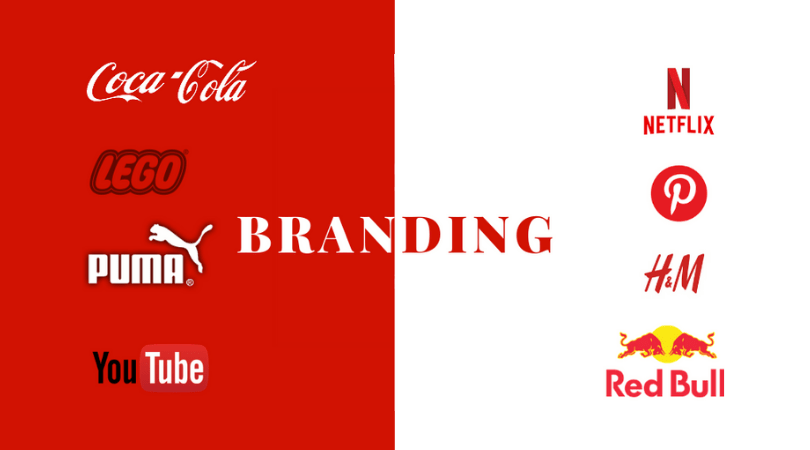
Branding is set up from the very early stages of a new project, all related to marketing, designing, communication, and even human resources. Also, branding influences every component of the organization, from human resources to the quality of the product or the service you offer.
What is Branding? Branding is the “Face” of Your Business
As Jeff Bezos says, “Branding is what people say about you when you’re not in the room.” Sounds pretty accurate for an out-of-the-box definition, right? It must be, as it comes from the founder of Amazon and the wealthiest man on the planet. Brand identity is the collection of elements a company creates to portray the right image to its consumers.
As Neil Patel says, by defining your brand identity, you define your way of communicating with the world, differentiate yourself from your competition, and create a brand experience that encourages people to engage with you. If you want your brand to succeed and thrive in the future, you must build a brand identity that accurately conveys your essence and is flexible enough to evolve with you.
Depending on your company’s goals, your needs may be more expansive, but an essential brand identity includes certain brand assets. When considering what are branding assets, you understand how a brand in strategically positioned and built.
- Logo;
- Colors;
- Typography;
- Design System;
- Illustration;
- Iconography;
- Data visualization;
- Interactive elements;
- Video and motion or still images;
- Web design
So, branding is at least about all these from above. Though, it depends from company to company and from case to case which branding strategy you must adopt. Indeed, there is a way to handle a branding strategy for a hypermarket present all over Europe and a way to handle the branding strategy for a boutique hotel in France. The approach is different.
Brand Strategy strengthens your brand

Branding strategies are the action plans that organizations use to differentiate their products, services, and identities from their competitors. In simple terms, if you want to succeed, then you need to learn how to create a brand that becomes your customer’s best friend. Brand identity is the collection of elements a company creates to portray the right image to its consumers.
The brand strategy refers to how, what, where, when and to whom you plan to communicate and deliver your brand’s messages. Also, to define a strong brand strategy, you need to answer the following questions:
What are the goals of the company?
Do they plan to become a multinational company, or do they want to be the leading seller of a particular product within a national territory?
Who are the buyers of your brand or your brand’s products?
Are they international? Are they from the neighbourhood or the surroundings of a physical shop? Are they online shoppers?
How do you define your long-term brand success?
Is it about brand recognition? Is it about the quality of your products in services?
What does your brand stand for?
Does it stand simply as an interface for the consumers to recognize your products? Does it convey the values of the organization?
What does your brand promise to customers?
Is it quality? Is it experience? Is it efficient?
Branding must project a unique image of your company
The fundamental idea of the brand is that, through everything it does, what it owns and produces, the organization must project a clear image of itself and its goals. The best thing to do is to establish, within and outside the organization – through elements such as products, environmental care, communication, and behaviour.
The specific idea is the engine of the organization. It refers to the essence of the organization, to what it claims, and to its vision. Each organization is unique, even if the products or services are more or less the same as the competition. What characterizes or shapes the company is its history, structure, and strategy, the personalities that created it and that went on, and also its successes and failures. Therefore, personal branding is essential.
The message communicated by a brand can have up to six types of meanings:
- Attributes – evokes in the mind of the buyer certain attributes;
- Advantages – the attributes must be translated into functional and emotional benefits;
- Value – the brand also says something about the manufacturer’s value system;
- Cultural symbols – they can represent a specific type of culture;
- Personality – can evoke a specific type of personality;
- Gender user – suggests the type of consumer who buys or uses the product or service.
Strong branding generates referrals and engagement and converts people into consumers
A powerful brand can create referrals or, in the era of social media, can create viral traffic because people love to tell others about the brands they like.
Because referrals have such a vast reach, it’s easier for companies to accelerate their brand marketing strategy and improve recognition for their company. For instance, if a customer uses a branded hashtag when referring your company to their work friend, then everyone in your network will be able to see this positive feedback.
Nowadays, customers are more empowered than ever. Before deciding how they want to spend their cash, they need to ensure they can trust the brand they’re working with. Your clients are already looking for evidence that they can trust you online in the form of reviews and testimonials.
Branding proves to be a much broader, more complex field to approach
Branding is not just limited to the sphere of commerce. We live in a world where opera ensembles, orchestras, charities, movie companies, and sports clubs are also brands. Moreover, in an increasingly globalized era and terms of fragments, cities, rules, and nations, they are implementing large-scale branding programs for self-confidence, cultivating the spirit of the place, tourism, and attracting internal investment. Thus, branding is proving to be a much broader, more complex, and more critical field in marketing.
In conclusion: no branding, no differentiation
The key knowledge about branding can be resumed in three main ideas:
- No branding, no differentiation.
- No differentiation, no long-term profitability.
- People don’t have relationships with products; people are loyal to brands.
If you need assistance with your brand, from creating your initial brand strategy to the visual identity elements, please contact us! We’d love to help you!
